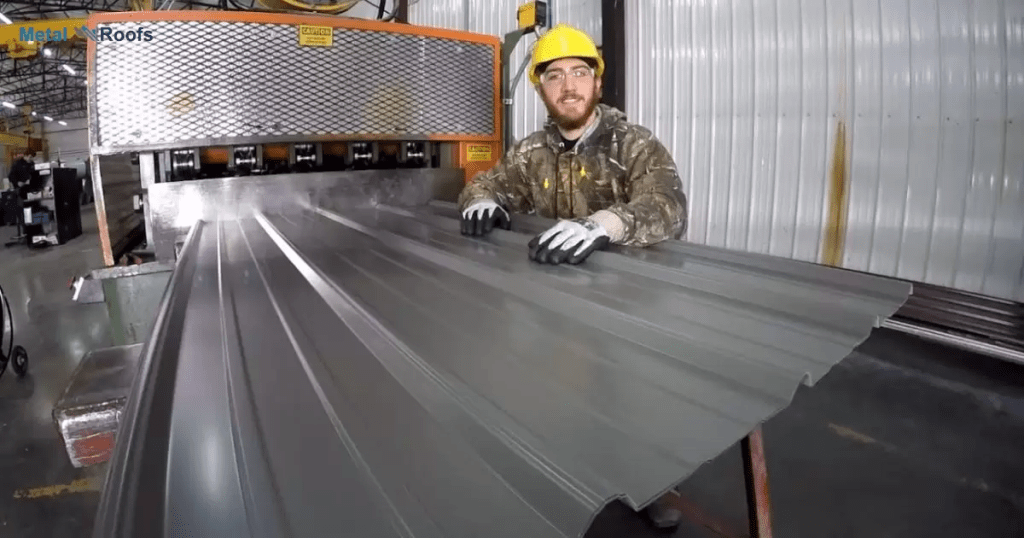When considering a new roofing material, many homeowners come across various metal options, including 29 gauge metal roofing. The question, “Is 29 gauge metals roofing good?” often arises, prompting a deeper look into the benefits and drawbacks of this particular gauge of metal roofing. In this detailed guide, we will explore what 29 gauge metal roofing is, its advantages and disadvantages, and whether it is a suitable choice for your home.

Understanding 29 Gauge Metal Roofing
What is 29 Gauge Metal Roofing?
Metal roofing is measured by gauge, which indicates the thickness of the metal. The lower the gauge number, the thicker the metal. A 29 gauge metal roof is relatively thin compared to other gauges, such as 26 or 24 gauge. Despite its thinner profile, 29 gauge metal roofing is commonly used due to its cost-effectiveness and suitability for various applications.
Read too: How To Replace Roof Shingles That Blew Off: A Comprehensive Guide
Common Materials for 29 Gauge Roofing
29 gauge metal roofing is typically made from materials like:
- Steel: Often coated with zinc (galvanized) or a combination of zinc and aluminum (galvalume) for enhanced corrosion resistance.
- Aluminum: Lightweight and resistant to corrosion, making it suitable for coastal environments.
- Copper: Though less common in 29 gauge, copper is a premium material known for its durability and unique patina.
Advantages of 29 Gauge Metal Roofing
1. Cost-Effectiveness
One of the main reasons homeowners choose 29 gauge metal roofing is its affordability. It is generally less expensive than thicker gauges, making it a budget-friendly option for roofing projects. The lower cost can be particularly appealing for those looking to balance quality and expense.
2. Lightweight
29 gauge metal roofing is lighter than thicker metal roofing options. This characteristic simplifies handling and installation, potentially reducing labor costs and making it easier to install on various types of structures.
3. Good Durability for Its Thickness
While not as thick as 26 or 24 gauge metal, 29 gauge metal roofing still offers decent durability. It can withstand moderate weather conditions and provides adequate protection for many types of buildings.
4. Energy Efficiency
Metal roofing, including 29 gauge, often comes with reflective coatings that enhance energy efficiency. These coatings help reflect solar heat, which can reduce cooling costs in hot climates.
5. Low Maintenance
Metal roofs, including 29 gauge options, generally require less maintenance compared to other materials like asphalt shingles or wood. They do not rot, crack, or warp, reducing the need for frequent repairs.
Disadvantages of 29 Gauge Metal Roofing
1. Lower Durability Compared to Thicker Gauges
While 29 gauge metal roofing is durable, it is not as resilient as thicker gauges such as 26 or 24 gauge. It may be more susceptible to denting and damage from impacts or severe weather conditions.
2. Potential for Increased Noise
Thinner metal roofs can be noisier during heavy rain or hail compared to thicker metal options. Although insulation can help mitigate this issue, it is something to consider if you live in an area prone to frequent storms.
3. Limited Warranty and Lifespan
The warranty and lifespan of 29 gauge metal roofing might be shorter compared to thicker gauges. Manufacturers may offer warranties that reflect the material’s thinner profile and its performance limitations.
4. Reduced Insulation Properties
Thinner metal roofs like 29 gauge may have less insulation value compared to thicker gauges. This can affect the roof’s ability to maintain consistent indoor temperatures, potentially increasing heating and cooling costs.
Is 29 Gauge Metal Roofing Good?
To determine if 29 gauge metal roofing is a good choice for your specific needs, it’s essential to consider various factors:
1. Climate and Weather Conditions
- Moderate Climates: 29 gauge metal roofing can be a good option in areas with moderate weather conditions. It provides adequate protection without the higher cost associated with thicker gauges.
- Extreme Weather: If you live in an area prone to severe weather, such as heavy snowfall or high winds, you might want to consider a thicker gauge metal roofing for enhanced durability and performance.
2. Budget Considerations
- Cost-Effective Solutions: For those on a budget, 29 gauge metal roofing offers a cost-effective solution without compromising too much on quality. It provides a balance between affordability and performance.
- Long-Term Investment: If you are looking for a long-term investment and can afford a higher initial cost, thicker gauges like 26 or 24 gauge may offer better durability and a longer lifespan.
3. Aesthetic Preferences
- Visual Appeal: 29 gauge metal roofing comes in various styles and colors, allowing you to choose a look that complements your home’s architecture. While it may not have the same premium feel as thicker metal options, it still offers a modern and sleek appearance.
4. Maintenance and Longevity
- Low Maintenance Needs: If you prefer a roofing material that requires minimal maintenance, 29 gauge metal roofing fits the bill. It is less prone to issues like rot or warping compared to other materials.
- Expected Lifespan: Consider the expected lifespan of 29 gauge metal roofing compared to other options. While it offers good durability, thicker gauges may provide a longer lifespan and better long-term performance.
Conclusion
The question, “Is 29 gauge metal roofing good?” depends on your specific needs and priorities. 29 gauge metal roofing is a cost-effective and lightweight option that offers decent durability and low maintenance. It is suitable for moderate climates and budget-conscious homeowners. However, if you require enhanced durability, reduced noise, or better insulation properties, you might consider thicker metal gauges or alternative materials.
Ultimately, the decision should be based on your budget, local weather conditions, and long-term goals. Consulting with a roofing professional can provide valuable insights and help you choose the best roofing solution for your home.



Leave a Reply